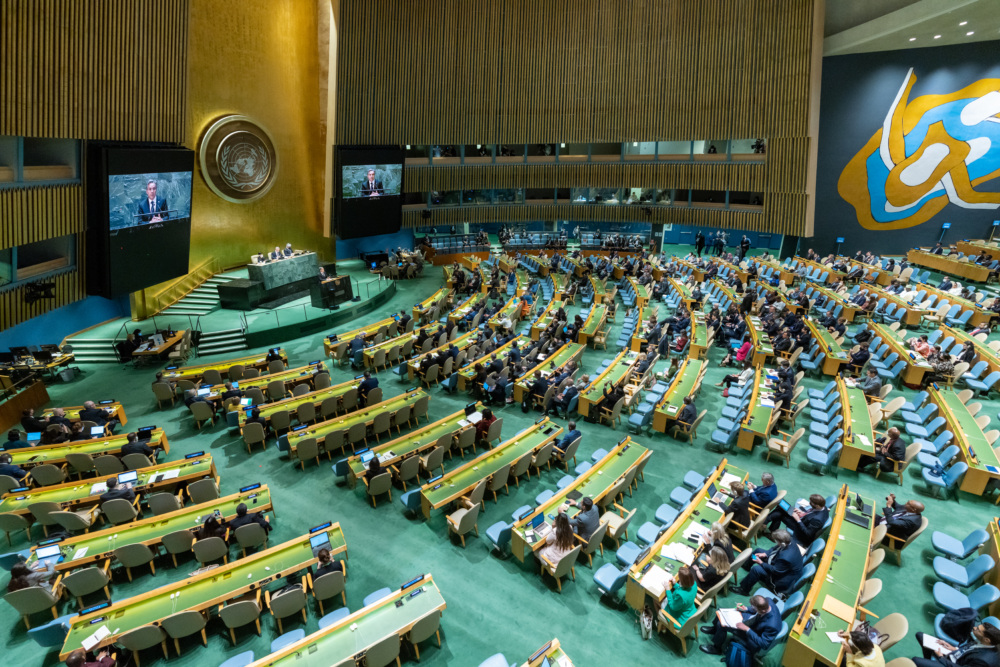
Atomic Pulse
Nuclear-Weapon States Must Join the Nuclear Weapons Ban Negotiations

The United Nations
General Assembly will convene negotiations on a treaty to prohibit nuclear
weapons during sessions scheduled for March 27‑31 and June 15‑July 7,
2017. Following those sessions, the General Assembly will review progress and decide
on a path forward.
Although the UN General Assembly last
October voted by a three-to-one margin in favour of convening negotiations on a
nuclear weapons ban, four of the five nuclear-weapon states (NWS) that are party
to the Nuclear Non-Proliferation Treaty (NPT)—the United States, Russia, the
United Kingdom and France—with support from a number of U.S. allies, voted against
the negotiations and indicated they will not participate. The fifth NWS, China,
abstained–though in a speech to the UN in Geneva on January 18, President Xi
Jinping reiterated China’s long-standing support for nuclear
disarmament, so there is reason for hope that China will participate in the negotiations and lead the way for the
other NWS to join.
The NWS that oppose the negotiations maintain
that the pace of nuclear disarmament cannot be forced. They argue that the
negotiations are unrealistic and a distraction from the sustained practical
steps needed for effective disarmament. Ultimately, they say, the negotiations
could damage the NPT. Against these objections, however, it must be pointed out
that the NPT requires all parties to pursue negotiations in good faith on
effective measures to achieve nuclear disarmament. Although the meaning of “pursue
negotiations in good faith” is open to interpretation, a boycott of negotiations
called for by the great majority of parties cannot be considered consistent
with this obligation. It is the refusal to join the negotiations, rather than the
convening of them, that risks damaging the NPT.
Of course, it
also is essential to avoid unrealistic expectations. Most countries well understand that nuclear weapons cannot be eliminated
overnight. Disarmament must be a stepwise process. Some steps are possible in the
near term; others will take many years. But no progress can be made if the
parties will not talk to one another.
A ban treaty
would be an important step, further stigmatising nuclear weapons, reinforcing
the goal of elimination, and preparing the ground for subsequent steps. The
exact terms of a ban—including whether it would prohibit possession or in the
first instance only use—are yet to be negotiated. The great majority of countries
that want to see a ban have every right to know whether the NWS have any alternative
and what they propose for achieving the NPT’s disarmament objectives. This
requires the NWS to engage with the non-NWS.
For the
future, it is essential to expand the scope of nuclear arms reductions. These
have primarily involved the U.S. and Russia.
There is a need to expand such negotiations to include the other NWS
(UK, France and China) as well as the nuclear-armed countries outside the NPT
(India, Israel and Pakistan—leaving aside North Korea which will probably need
to be addressed as a specific case). The ban negotiations will be a good start for bringing
these other countries into the nuclear disarmament process.
For further
discussion on the ban negotiations and the common interests shared by NWS and
NNWS, see my paper recently published by the Asia Pacific
Leadership Network, A
Nuclear Weapons Ban – Finding Common Ground.
Based
in Australia, John Carlson advises NTI leadership on international nuclear
security, safeguards and verification, and management of the nuclear fuel
cycle. He supports NTI’s efforts in the Asia-Pacific region on nuclear security
and arms reduction, and is a member of the Asia Pacific Leadership Network.
Carlson is a Nonresident Fellow at the Lowy Institute, a member of the Advisory
Council of the International Luxembourg Forum, an Associate of the Project on
Managing the Atom, Belfer Center, Harvard University and a member of VERTIC’s
International Verification Consultants Network. Carlson was an official in the
Australian government for more than four decades.
Carlson’s
views do not necessarily reflect those of NTI or the NTI Board of Directors or
the institutions with which they are associated.
Stay Informed
Sign up for our newsletter to get the latest on nuclear and biological threats.
More on Atomic Pulse

The 2023 NPT PrepCom: An Opportunity to Capitalize on Common Ground
As officials prepare to meet in Vienna for the 2023 PrepCom, they should consider some of the key themes that have emerged from NTI’s Global Enterprise to Strengthen Non-Proliferation and Disarmament.

Oppenheimer and Advocacy: You’ve Seen the Film, Now What?
Considering the current nuclear landscape, the power of Christopher Nolan’s film and the moral and ethical questions raised by J. Robert Oppenheimer’s work, movie viewers may be motivated to act to advocate for a world without nuclear weapons. But how?

The NTI Essentials: 10 things you should read (or watch) on reducing nuclear risks
If you want to learn more about Oppenheimer’s bomb and what we must do to protect the world today and for future generations, NTI’s online library is the perfect place to go.
